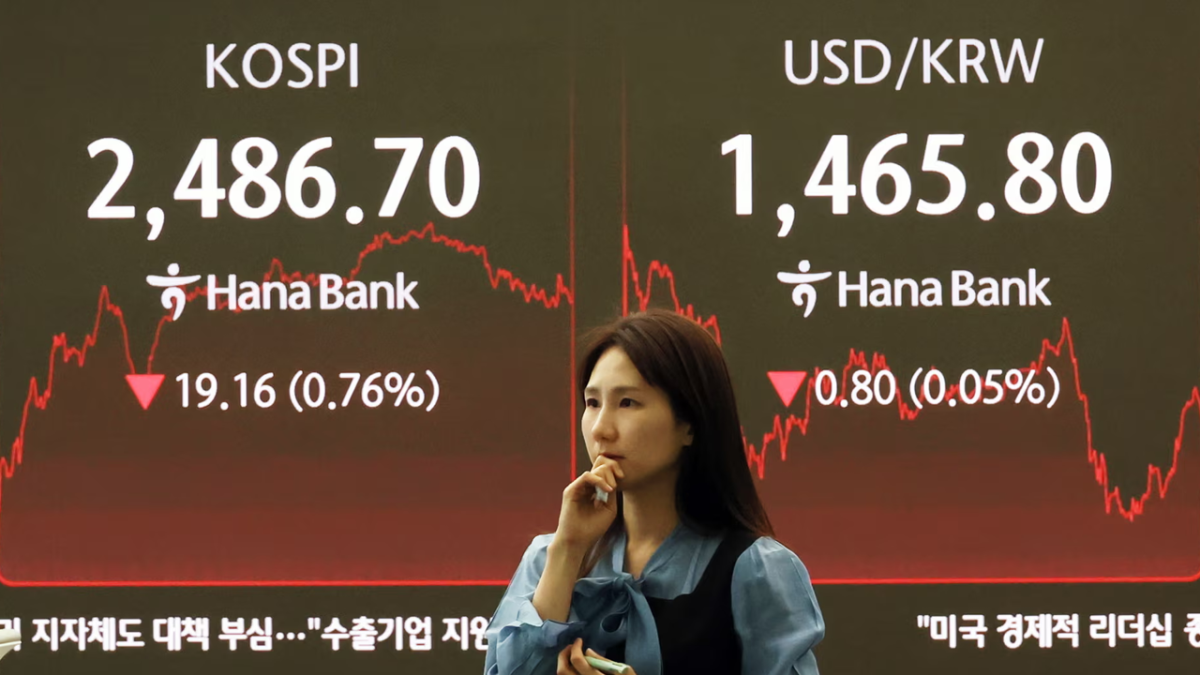Global stock markets fall and dollar dives as Trump tariffs push investors to bonds, gold and yen
Global stock markets fall and dollar dives as Trump tariffs push investors to bonds, gold and yen
Asian and European markets plummet after falls on Wall street, with Nadaq down 3.3% and US dollar at six-month low
Asian and European markets plummet after falls on Wall street, with Nadaq down 3.3% and US dollar at six-month low
Global stocks fell sharply and the US dollar hit a six-month low after US president Donald Trump unveiled sweeping tariffs against America’s global trade partners, in a move that is expected to upend supply chains and cause economic turmoil.
European markets opened lower on Thursday after a sharp selloff across Asia and US futures signalled similar falls when Wall Street opens.
In London, the FTSE 100 fell 1.3%, Germany’s Dax was down 1.6% and France’s CAC was off 1.8%.
It followed a major sell-off in Asia where trading partners were hit with some of the highest tariffs, beyond the baseline 10% applied to imports from all countries selling goods to the US.
Overnight, Japan’s Nikkei and Topix fell 3.3% and 3.5%, respectively, after Trump’s decision to apply a 24% tariff on the country. Hong Kong’s Hang Seng was down 1.9%, while the Vietnam stock marker – which was hit with 50% tariffs – tumbled 6.7%.
US futures also suffered, with the Dow futures pointing at losses of 2.1% and S&P 500 futures falling about 3%.
Futures for the tech-focused Nasdaq were the hardest hit of the three main markets, down 3.5%, with constituents such as Apple – which still has large exposure to China – plunging 7%. Nike took a similar dive of 7.3% while AI chip maker Nvidia dropped 5.6%, and Tesla tanked more than 8%.
The dollar was down 1.1% against a basket of foreign currencies, including the pound which was up more than a cent or 0.9% at just above $1.31.
Adam Hetts, a portfolio manager at Janus Henderson Investors, warned that markets were unlikely to calm down anytime soon.
“Eye-watering tariffs on a country-by-country basis scream ‘negotiation tactic’, which will keep markets on edge for the foreseeable future. Fortunately, this means there’s substantial room for lower tariffs from here, albeit with a 10% baseline in place.
“We’ve seen the administration have a surprisingly high tolerance for market pain, now the big question is how much tolerance it has for true economic pain as negotiations unfold,” Hetts added.
Oil prices also fell, with a barrel of Brent crude down 3.3% at$72.50 amid fears that sweeping tariffs would trigger a global recession, dampening energy demand.
Meanwhile, investors flocked to so-called safe-haven assets such as gold, pushing prices to a new record high of $3167.50 overnight.
“The tariff rates unveiled this morning far exceed baseline expectations, and if they aren’t negotiated down promptly, expectations for a recession in the US will rise dramatically,” IG market analyst Tony Sycamore said.
Yorumunuz başarıyla alındı, inceleme ardından en kısa sürede yayına alınacaktır.


















